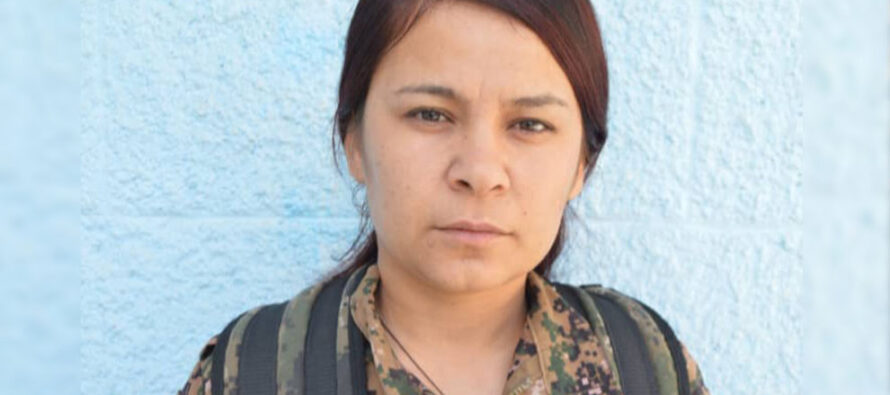Family members of YPJ fighter Çiçek Kobanê expelled from Turkey

![]()
Three members of the family of YPJ fighter Çiçek Kobanê (Dozgin Temo), who was wounded and imprisoned last October in the course of the Turkish invasion in the self-governing areas of northern Syria and has been held in custody since her deportation to Turkey in violation of international law, have been deported to Kobanê.
According to the Mezopotamya news agency (MA), police officers stormed the workplace of Salih Temo, the father of Çiçek Kobanê, and arrested him and his sons Mahmut (15) and Mustafa (18) on Monday in the Northern Kurdistan border town of Suruç in Urfa province. All three were then deported to northern Syria via the Mürşitpınar border crossing, which is closed for official border crossings. The deportation is said to have been extremely violent, MA reports. Accordingly, Salih Temo was beaten by officials. In addition, almost all his fingers are said to have been broken.
The remaining family members, who have been living in Suruç since the Turkish-backed attack on Kobanê by the Jihadist militia ISIS in 2014, will also leave Turkey in the next few days. It is unclear whether they will leave voluntarily or have been ordered to do so by the authorities.
Abduction of Çiçek Kobanê
Women’s Defense Units (YPJ) fighter Çiçek Kobanê was injured and fell into the captivity of the jihadist militia Ahrar al-Sham/Battalion Darat Izza in the village Mishrefa near Ain Issa on 21 October. The Darat Izza group has participated in the illegal invasion of Rojava alongside NATO partner Turkey and its so-called “Syrian National Army”. Photos and videos of the capture of Çiçek Kobanê have appeared on social networks, in which the gangs announced the execution of the fighter.
The jihadists presented the YPJ fighter and shouted, “To the slaughterhouse, to the slaughterhouse.” Only after international protests was she transferred to Turkey. She cannot stand up on her own and cannot look after herself.
After her capture, she was taken to the anti-terror department of the police headquarters. In December it became known that the Chief Prosecutor’s Office Urfa had brought charges against Çiçek Kobanê and at least 98 other prisoners of war from northern Syria. They are accused of “disturbing the unity and integrity of the state”, “membership to an armed terrorist organization” and “intentional murder attempt”. They are all being held in various prisons. Çiçek Kobanê was last imprisoned in Urfa. It is not known whether she will continue to be held in the high security prison.
Related Articles
One Year on From Afrin, and now East of the Euphrates: More War?
![]()
“The goal of the United States from delaying this agreement is to make room for Turkey to enter easily when the US withdraw from its military bases…” (Syrian Observatory for Human Rights)
ALFONSO SASTRE. LA PACE E’ UN IDEA SOVVERSIVA
![]()
Intervista di Fermin Munarriz
Gara. Dicono che è il più grande drammaturgo spagnolo degli ultimi decenni. Ed anche basco. Perché ha deciso di esserlo. E di vivere in un paese che ama e ammira. La sua estesa opera è stata un impulso permanente contro la censura; la sua vita, un impegno con la libertà; il suo pensiero, una esplorazione costante della essenza umana. Dalla torre di guardia intellettuale o dall’asfalto della strada, è sempre stato – ed è – per chi lo necessita. Non ha risparmiato generosità. Ne lucidità. Per questo non lotta contro i mulini; lotta contro i giganti.
Signor Sastre: tragedia, commedia…In che funzione sta in questo momento l’ordine mondiale?
Non è facile spiegare la realtà con questi concetti…Già nel Rinascimento vennero smontati questi feticci e nacque la tragicommedia, che è una visione più complessa della realtà. La tragicommedia iniziò a dare grandi frutti: la tragedia grottesca, l’esperpento. (stile letterario basato sulla deformazione grottesca della realtà). E’ qui dove si trova il genere che possa riflettere la realtà attuale: una tragicommedia o un esperpento o una tragedia che fa ridere..Per me è una tragedia complessa. Siamo in un momento nel quale possiamo ridere però non piangere. Non è un momento per ridere ne un momento per piangere, ma di ridere per non piangere.
E nel caso di Euskal Herria?
Euskal Herria non è un caso speciale. In altri temi ha una caratteristica differente rispetto a quanto avviene in altri luoghi, però per quanto riguarda se è da ridere o da piangere, si può dire che una situazione nella quale si ride per non piangere, però che ci sono molte ragioni per piangere.
Viviamo, forse, una sorta di penitenza per la non rottura democratica con il franchismo?
In Euskal Herria si verificò una forte resistenza alla Riforma, che anche la sinistra spagnola preconizzava. Arrivò un momento nel quale le idee della necessita di una rottura democratica scomparvero dai territori di Spagna e si rifugiarono in Euskal Herria; è qui dove cristallizzarono le idee del fatto che non si andrà da nessuna parte che meritasse la pena se non si verificava una nuova situazione in termini di rottura. Queste idee cristallizzarono qui e sono l’origine di ciò che poi fu la sinistra indipendentista. Questa fu una delle ragioni – a parte molte altre – del fatto che noi decidemmo venire qui. Vedemmo che le nostre idee più o meno erano socialmente ammesse in questo paese e no in Spagna.
In questo contesto, qual è la responsabilità morale dell’intellettuale nella società?
E’ la stessa di sempre: essere fedele alla sua vocazione intellettuale. E’una vocazione per la verità, per l’esplorazione della verità e per la difesa della giustizia. Sembra che alcuni intellettuali assumano questa responsabilità ed altri la appartino un po’ e si limitano formalmente a lavorare a favore dell’intelligenza in termini di disimpegno totale da un punto di vista politico.
Crede che gli intellettuali baschi sono all’altezza della situazione?
Io ho un problema per poter rispondere a questa domanda al non essere capace di leggere ciò che scrivono gli intellettuali baschi in euskera. Qualsiasi opinione esprimessi sarebbe superficiale e sicuramente ingiusta. Però nel teatro, dove si vedo quanto si fa, più o meno, o quanto si pretende fare, credo che le genti del teatro basco non sono all’altezza delle circostanze nelle quali si vive in questo paese. Io ho cercato in alcune occasioni di far interessare ai miei colleghi nell’ esempio – non per seguirlo ma forse per ispirarsi ad esso – di ciò che fu il teatro irlandese nelle prime decadi del secolo XX. In alcune circostanze analoghe – con distinguo – nacque un teatro magnifico, di grande livello in Europa.
Il teatro in castigliano si manifesta abbastanza al margine delle questioni più patenti e latenti di questa società. E’ un teatro che guarda da un’altra parte e non per la realtà; forse per paura a guardare la realtà. La realtà a volte mette paura, anche questo è vero.
Gli intellettuali spagnoli e francesi sono all’altezza delle circostanze rispetto al caso basco?
No, sono all’altezza della loro ignoranza su questa situazione. Io credo che sono ignoranti. Lo vedo con gli spagnoli che conosco, sono più o meno alla pari –diciamo, in tutto, meno su questo tema. Quando si tratta il tema basco lo ignorano e, inoltre, sembra che rifiutino d comprenderlo…
A cosa si deve questo atteggiamento?
Al patriottismo, allo sciovinismo da grande potenza…Lenin già parlava del patriottismo sciovinista; faceva una critica a ciò che si chiamava sciovinismo da grande potenza. E Spagna e Francia sono grandi potenze in relazione a Euskal Herria. Lo sciovinismo è una filosofia comune che impedisce assolutamente vedere ciò che accade qui. E’ molto difficoltoso. Mi dicono amici che vivono a Madrid, per esempio, quanto difficile sia fare comprendere alcune cose che si comprendono vivendo qui. E si deve al patriottismo spagnolo completamente accecante.
IL BDP KURDO ELEGGE LA PRESIDENZA
![]()
L’assemblea straordinaria del BDP (il partito della pace e della democrazia) che ha sostituito il DTP (partito della società democratica)



